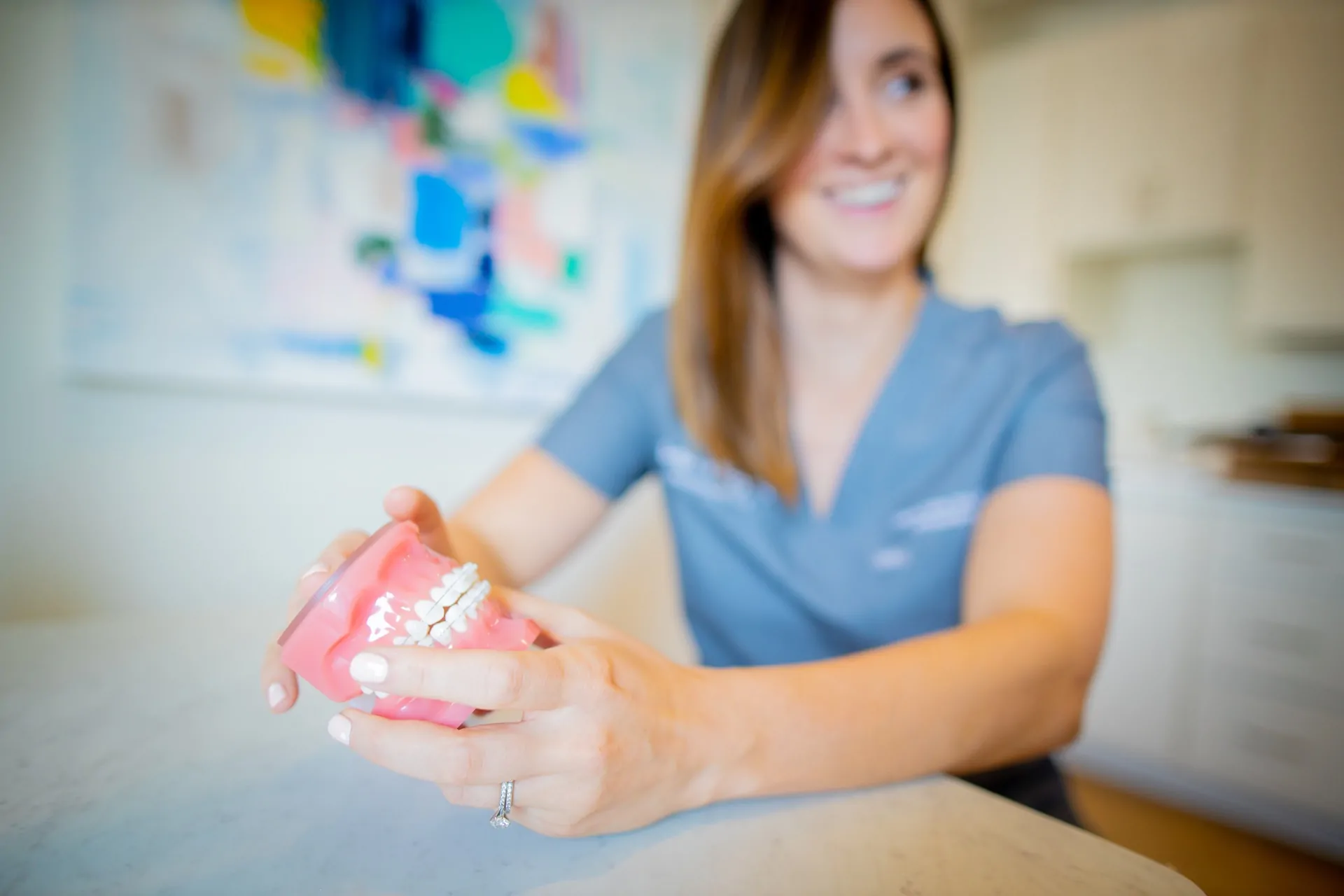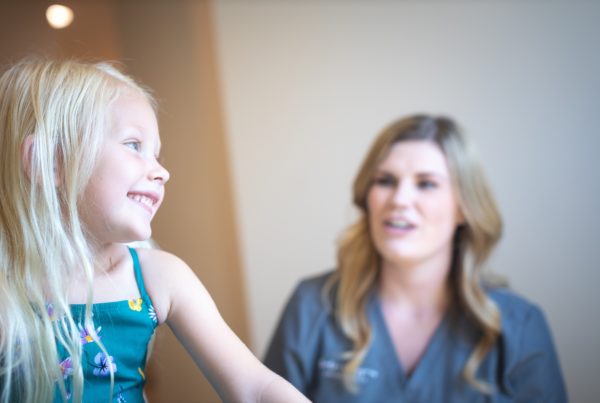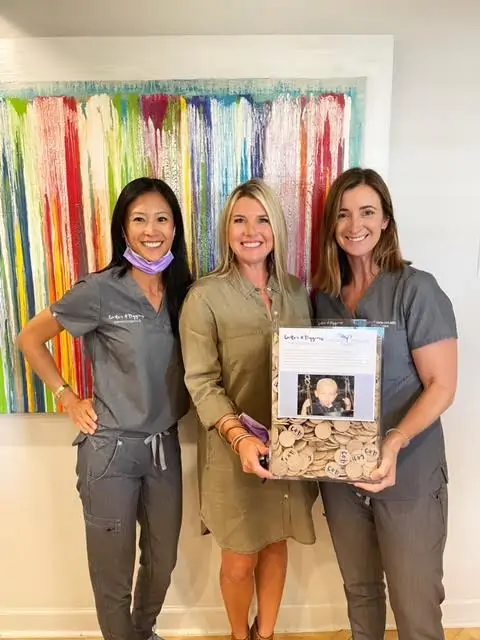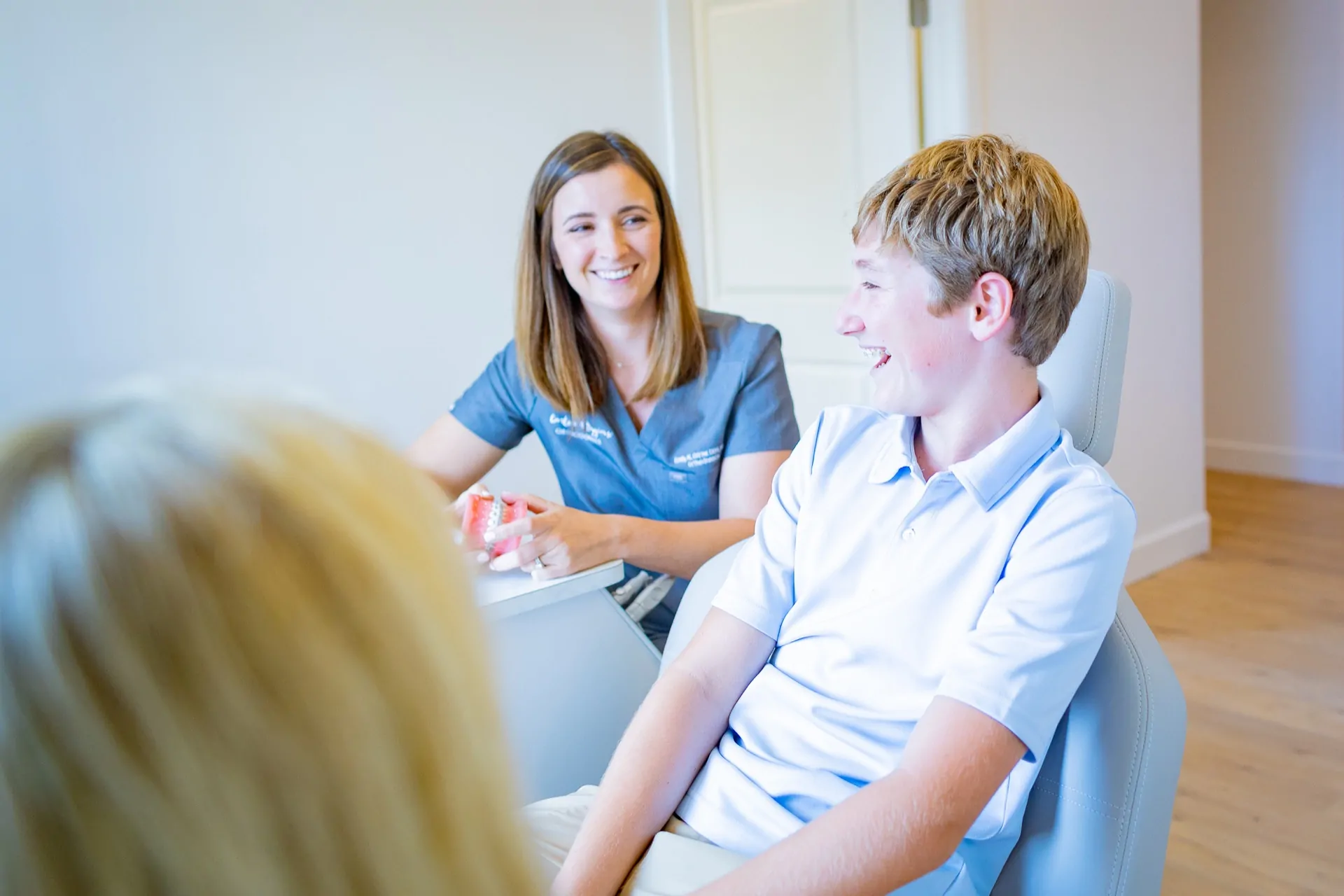People come to us seeking to repair various dental issues, from overbites to crooked teeth to gap teeth. Some come to us with a unique overbite called an open bite. With a normal overbite, the upper teeth sit forward of the lower ones, but they are vertical as they should be. The teeth are projected outward with an open bite, making treatment a little more complicated.
What does an open bite look like? What open bite treatment options are available? Why should you fix your open bite issues? We’ve heard all these questions at Carter & Higgins Orthodontics, and we can provide answers to these questions and more. Let’s start by explaining what an open bite is.

What Is an Open Bite?
An open bite is a type of malocclusion (bad bite), which can also include an overbite, underbite, or crossbite. With a normal bite, your upper teeth at rest sit just over your lower teeth. With an open bite, teeth do not connect at all, and there is a space between the upper and lower teeth. This is usually because the upper teeth are pushed slightly outward, the bottom teeth are pushed slightly inward or outward, or both. It is also possible to get an open bite on your back teeth, but that is extremely rare. The vast majority of open bite cases involve the front teeth.
An open bite is either a dental open bite or a skeletal open bite. In other words, it’s created from something such as thumb-sucking or tongue-thrusting, or it’s caused by genetics, which can include a deformed or cleft palate.

What Are the Problems With an Open Bite?
Left untreated, an open bite can cause many short- and long-term problems. An open bite causes your teeth to be out of alignment, which can cause everything from speech problems to jaw pain. Let’s take a look at the issues an open bite can cause.
- Bite problems: It is more difficult to bite and chew because your teeth don’t meet.
- Speech problems: Your tongue makes contact with your teeth when you talk. When your teeth are not in the proper place, speech can be more difficult. You may develop a lisp.
- Digestive problems: Because you can’t bite and chew properly, your digestion doesn’t fully begin in the mouth as it should. Your stomach must work harder, which could lead to digestive problems.
- Changed profile: An open bite can give your profile the appearance of a protruding upper jaw and a receding chin.
- Headaches: Your jaw has extra pressure placed on it when the teeth aren’t in their proper position. This can lead to headaches, neck aches, and ear pain.
- TMJ Disorder: The temporomandibular joint (TMJ) has added pressure from badly positioned teeth. This can cause pain, popping, and inflammation in the joint, known as TMJ Disorder.
Snoring and Sleep Disorders: An open bite can include problems with your palate (roof of the mouth), plus your lower jaw drops back when you’re on your back. This can cause snoring and sleep disorders such as sleep apnea, which can be detrimental to your overall health.
What Causes an Open Bite?
There are several open bite causes, from genetics to bad habits. Some of these causes can be prevented or eliminated, while others simply will require repairs. Let’s look at some of the causes of an open bite.
Can Tongue Thrust Cause an Open Bite?
Some people have a habit of thrusting their tongue between the upper and lower front teeth when they swallow instead of the tongue hitting the gums behind the upper teeth. Over time, the tongue can push the teeth out of their proper place and create an open bite.
Can Thumb-Sucking Cause an Open Bite?
Thumb-sucking is one of the most common causes of an overbite and an open bite. It’s not uncommon for children to suck their thumb, but the practice should cease by the time they’re two years old. Otherwise, it can affect their bite by deforming their palate and misaligning the permanent teeth as they erupt. It could cause speech problems with your child that may be difficult to overcome the older they get. That’s why it’s important to stop the habit before an open bite or an overbite forms.
Can a Pacifier Cause an Open Bite?
Can your child get an open bite from a pacifier since it’s softer than a thumb? The answer is yes. Even with the pacifier being softer than the thumb, the strong suction and the placement of the pacifier can still create an open bite. As with thumb-sucking, the pacifier habit should be ended by the age of 2, or an overbite or open bite could form.
Can Genetics Cause an Open Bite?
Structure-caused open bites are possible as well. This is when you’re prone to skeletal structure issues between your upper and lower jaws as a family trait. Genetics can create problems with your bite, whether it’s a cleft palate, a deformed palate (too deep or too narrow), or just a facial structure where the lower jaw is smaller or sits back from the upper jaw.

Open Bite Treatment Options
It’s important to treat an open bite as soon as possible and the cause of the open bite if it’s related to a continuing habit. The longer you wait, the more likely you will develop more severe issues, including jaw pain, sleep disorders, and permanent speech problems. Several treatment options are available for an open bite, including braces and Invisalign. Patients in the Tulsa, OK, area can contact Carter & Higgins Orthodontics to explore their treatment options.
Fixing an Open Bite: Braces
Braces are the most tried-and-true method for correcting an open bite. Open bite treatment with braces can fix the open bite and any other dental issues you may have with it, such as an overbite or crooked teeth. The treatment is relatively easy for both adults and children. Patients who still have bad habits such as thumb-sucking or tongue-thrusting may start with a tongue-training appliance to ensure the open bite doesn’t return after treatment. Once the bad habits are corrected, treatment with braces begins.
Fixing an Open Bite: Invisalign
Can Invisalign fix an open bite? It’s a good question. It may have been more challenging to use Invisalign to correct an open bite in the past, but advances in the product and the field of orthodontics have changed that. Nowadays, fixing an open bite with Invisalign has become more common. Still, the most severe cases would do better with braces. The doctors and Carter & Higgins Orthodontics can determine whether you’re a good candidate to fix your open bite with Invisalign.
Removing Bad Habits
Behavior modification therapy can be used to break a child of bad habits such as tongue-thrusting and thumb-sucking. Early behavior modification can be very successful, particularly in younger children, but it can also help older children and adults. If that doesn’t help, therapy can be assisted by orthodontic appliances such as a tongue crib or tongue spurs.
Retainers After Treatment
Once treatment with braces or Invisalign is complete, the patient will need to wear retainers. The retainers will keep the teeth in place and ensure your new bite stays. Your tongue will also remain in its proper place now. Retainers need to be worn according to your orthodontist’s instructions to keep your teeth in their proper positions while your jaw sets after treatment.
Oral Surgery for Extreme Cases
In rare and extreme cases, oral surgery may be needed to correct a severe open bite. Oral surgery is used in conjunction with orthodontic treatment, such as braces, to correct a severe open bite. This isn’t too common, as most cases can be treated with braces or Invisalign. The Carter & Higgins Orthodontics team will outline all treatment options for you, including whether you will need oral surgery.

Get Started Fixing Your Open Bite
Are you ready to fix your open bite? If you’re in the Tulsa, OK, area, it’s easy to get started! You can request a consultation with Carter & Higgins Orthodontics. We will give you a thorough examination, explain your options, and our flexible financing. You’ll be surprised at the difference when your open bite is repaired. Your eating and sleeping may improve, and even the shape of your face will be different. Plus, you’ll get the smile of your dreams! Repairing an open bite doesn’t just improve your self-esteem. It can improve your overall health.











